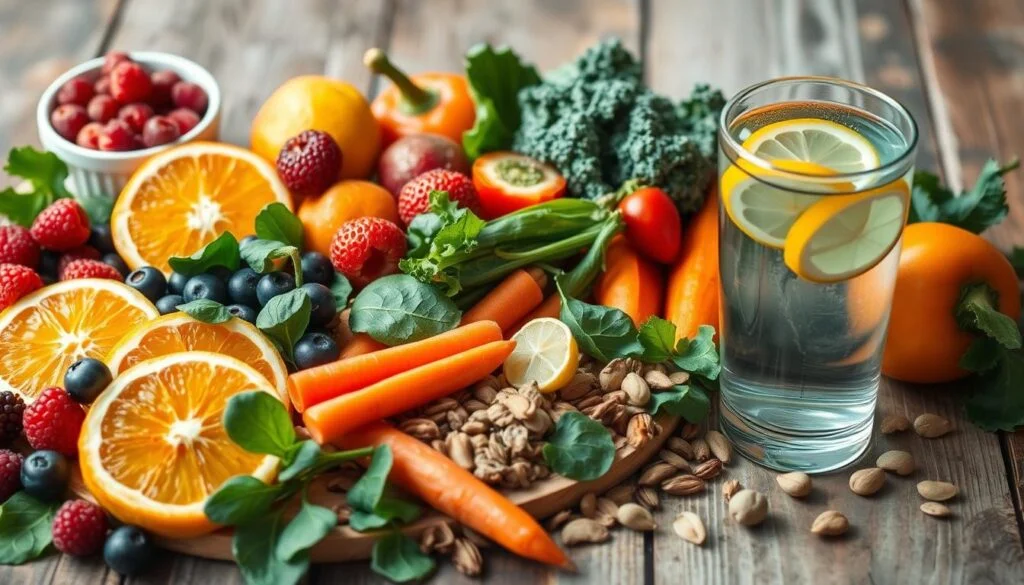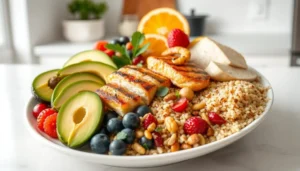Foods to Avoid for Clear, Glowing Skin: Expert Guide
Foods to Avoid for Clear, Glowing Skin
Many of us dream of having clear, radiant skin. But finding the right path can be tough. Our diet plays a big role in our skin’s health. Some foods can cause skin problems like acne and early aging.
In this guide, we’ll look at the foods experts say to avoid. These foods can help you get a clear, glowing complexion.

Key Takeaways
- Certain foods can negatively impact skin health and lead to problems like acne, inflammation, and premature aging.
- Understanding the skin-diet connection and how specific nutrients and compounds affect the skin at a cellular level is crucial.
- Avoiding inflammatory foods, dairy products, sugar, processed items, and high-sodium options can help improve skin appearance.
- Food allergies and sensitivities can also have a significant impact on skin health, and it’s important to identify and eliminate problematic foods.
- Making dietary changes can be a powerful way to achieve a clear, radiant complexion, as supported by scientific evidence and expert advice.
Understanding the Skin-Diet Connection
Our skin’s health is closely tied to what we eat. The foods we choose can deeply affect our skin, from how it looks to its overall health. Knowing how diet impacts skin is key to keeping it clear and glowing.
How Food Affects Skin Health at the Cellular Level
Our diet’s nutrients are vital for skin cell function and regeneration. Foods rich in antioxidants protect skin from damage. Essential fatty acids help keep skin hydrated and its barrier strong. On the other hand, inflammatory foods can cause skin issues like acne and aging.
The Role of Inflammation in Skin Problems
Inflammation plays a big role in many skin issues, from acne to eczema. Foods high in sugar and processed items can cause inflammation. This leads to skin irritation and can damage collagen. Eating a balanced diet that fights inflammation is key to healthy, glowing skin.
Gut-Skin Axis Explained
The gut-skin axis shows how our digestive system and skin are connected. Our gut health, shaped by diet, affects our skin’s look and function. Poor gut health can cause skin problems. Eating foods rich in probiotics and fiber supports a healthy gut-skin connection.
Understanding how food impacts skin health, inflammation, and the gut-skin axis helps us make better diet choices. Choosing an antioxidant-rich, anti-inflammatory diet is essential for optimal skin health.
These Foods to Absolutely Avoid If You Want Clear, Glowing Skin
If you want clear, radiant skin, watch what you eat. Some foods can cause acne triggers and harm your skin. Knowing which these foods to absolutely avoid if you want clear, glowing skin is key to better skin.
Processed and sugary foods, dairy, and greasy foods are bad for your skin. Let’s look at the top foods to avoid:
- Processed and fried foods: They have trans fats and additives that cause inflammation and clogged pores.
- Refined carbohydrates: White bread, pasta, and sugary snacks raise blood sugar. This can lead to acne triggers.
- Dairy products: They have hormones that can upset the skin’s balance, causing acne.
- Alcohol: It dehydrates and has inflammatory properties, harming skin and collagen.
- High-sodium foods: Too much sodium causes water retention and inflammation, worsening skin issues.
Removing these foods can help you get the skin you dream of. Stay tuned for more on how diet affects your skin.
Dairy Products and Their Impact on Skin Health
Research shows that dairy might harm our skin’s health and look. It talks about hormones in milk and how dairy could cause acne. This part explores the link between dairy and skin.
Hormones in Milk Products
Milk and dairy have hormones like IGF-1 and testosterone-like compounds. These can mess with our hormones, causing more oil and clogged pores. This leads to more acne.
Alternatives to Traditional Dairy
- Plant-based milks like almond, soy, or oat milk might be better for skin.
- They don’t have the hormones and inflammatory stuff in cow’s milk. This could lower acne and skin problems.
Scientific Evidence Linking Dairy to Acne
Many studies link dairy to acne. A 2018 review found a strong link between dairy products and acne. Eating milk and other inflammatory foods might make breakouts worse.
“The connection between dairy and acne is well-established in the scientific literature. Limiting or eliminating dairy from the diet can be an effective way to achieve clearer, healthier skin.”
Knowing how dairy affects our skin helps us make better food choices. We can take steps towards better skin by avoiding dairy.
Sugar and Refined Carbohydrates: Your Skin’s Enemy
The foods you eat greatly affect your skin’s health. Sugar and refined carbs are especially bad for your skin. These sugar-laden snacks and inflammatory foods can harm your skin health.
Eating too much sugar and carbs can hurt your body. These foods quickly raise your blood sugar, causing inflammation. This inflammation can lead to skin problems like acne and early aging.
Sugar and carbs also speed up glycation. This is when sugar molecules damage your skin’s proteins. This damage can make your skin look old and wrinkly.
- Sugar-laden snacks and refined carbohydrates can contribute to inflammation, which is a major factor in skin problems.
- Excessive sugar intake can accelerate the glycation process, leading to the formation of AGEs that damage collagen and elastin in the skin.
- Reducing your consumption of sugar and refined carbs can help improve the overall health and appearance of your skin.
By cutting down on sugar-laden snacks and inflammatory foods, you can improve your skin. Eating a diet rich in whole foods is a great step towards clear, glowing skin.

“Eliminating sugar and refined carbs from your diet can be a game-changer for your skin’s health and appearance.”
The Hidden Dangers of Processed Foods for Skin Health
Getting clear, glowing skin is more than just using the right skincare. It also depends on what you eat. Processed foods, full of artificial stuff, can harm your skin. They have additives, preservatives, and trans fats that can mess up your skin.
Artificial Additives and Preservatives
Processed foods often have synthetic additives and preservatives. These help them last longer and taste better. But, they can cause skin problems like acne, eczema, and early aging. Eating whole, natural foods can help your skin stay healthy.
Trans Fats and Skin Aging
Trans fats in processed snacks, baked goods, and fried foods are bad for your skin. They break down collagen and elastin, leading to wrinkles and sagging skin. Eating healthy fats like those in avocados, nuts, and olive oil can help keep your skin looking young and radiant.
Reading Labels for Skin-Harmful Ingredients
- When you shop, read food labels carefully. Look for long lists of hard-to-pronounce ingredients. These are often synthetic and can harm your skin.
- Stay away from products with partially hydrogenated oils or trans fats. They can make your skin age faster.
- Also, avoid artificial preservatives, colorants, and flavorings. They can cause inflammation and skin issues.
By choosing whole, minimally processed foods, you can nourish your skin. This way, you can get the clear, glowing skin you want.
Fast Food and Greasy Options to Eliminate
Fast food and greasy foods are big no-nos for clear skin. They’re full of fried foods, unhealthy inflammatory foods, and acne triggers. These can really mess up your skin.
Fast food and greasy meals are high in fat and calories. This can cause inflammation in your body. This inflammation can lead to breakouts, clogged pores, and dull skin.
These foods can also harm your gut microbiome. This is important for your skin health. An imbalance in gut bacteria can cause inflammation and worsen skin problems like acne and eczema.
To keep your skin clear and radiant, avoid fast food and greasy foods. Choose whole, nutrient-rich foods instead. These foods will nourish your skin from the inside.
| Food Item | Skin Impact |
|---|---|
| French Fries | High in fried foods, inflammatory foods, and acne triggers |
| Cheeseburgers | Contain fried foods, dairy, and high-fat ingredients |
| Chicken Nuggets | Heavily processed and fried, leading to inflammation |
| Pizza | High in fried foods, dairy, and refined carbohydrates |
By cutting out greasy and fried foods, you can improve your skin. This will help you achieve the clear, glowing skin you want.

Alcohol’s Effect on Skin Appearance
Enjoying a drink now and then is okay. But too much alcohol consumption can harm your skin. Knowing how alcohol affects your skin is key to keeping it looking young and healthy.
Dehydration and Skin Health
Alcohol makes your skin dry by dehydrating it. It’s a diuretic, which means it makes you lose more water. This makes your skin feel tight and look dull.
Dehydration also makes fine lines and wrinkles worse. Your skin might look older and more worn out.
Impact on Collagen Production
Drinking alcohol can also hurt collagen production. Collagen keeps your skin elastic and firm. Without enough collagen, your skin ages faster, gets saggy, and wrinkles form.
Regular alcohol consumption can make your skin lose its youthful glow. It’s hard for your skin to stay young and radiant when you drink too much.
Recovery Tips for Skin After Drinking
- Drink plenty of water to rehydrate and flush out toxins
- Apply a nourishing, skin-healthy moisturizer to replenish lost moisture
- Use a hydrating face mask or serum to deeply hydrate the skin
- Avoid additional sun exposure, which can further damage dehydrated skin
- Get adequate sleep to allow your skin to regenerate and repair
Knowing how alcohol consumption affects skin health helps. Using good recovery tips can lessen the harm. Drinking in moderation is important for your skin’s health and look.
High-Sodium Foods and Skin Inflammation
Healthy, glowing skin starts with what we eat. High-sodium foods are often overlooked but can harm our skin. Too much sodium can cause problems.
Processed foods, canned goods, and salty snacks are full of sodium. These inflammatory foods can make our skin puffy, red, and worse for conditions like eczema and acne. Knowing how sodium affects skin health helps us choose better for our skin.
The Skin-Sodium Connection
Sodium helps keep our body’s fluids in balance. Too much sodium makes us hold water, leading to puffiness. This can make our skin look swollen and irritated.
High sodium also causes body-wide inflammation, including in the skin. This can weaken our skin’s barrier, making it more vulnerable to damage and worsening skin problems.
Reducing Sodium Intake for Healthier Skin
- Limit processed foods and salty snacks since they’re high in sodium.
- Choose fresh, whole foods instead, as they have less sodium.
- Read labels and pick low-sodium or no-sodium options when you can.
- Try herbs, spices, and lemon juice for flavor without salt.
- Drink lots of water to help flush out sodium.
Being careful with sodium and choosing better foods can reduce skin inflammation. This helps us achieve a clear, radiant complexion.
Food Allergies and Their Impact on Skin Health
Food allergies play a big role in getting clear, glowing skin. The skin is our biggest organ and often shows signs of food sensitivities first. Foods that cause inflammation can lead to skin problems like acne triggers and other skin health issues.
Food allergies can cause inflammation in the body. This can lead to redness, swelling, and irritation on the skin. It can make existing skin problems worse or even cause new ones like eczema or acne triggers.
To fight the effects of food allergies on the skin, you need to find and avoid the foods that trigger your immune system. You might need to work with a doctor to do allergy tests or try an elimination diet. By avoiding your personal food sensitivities, you can get closer to the clear, radiant skin you want.
| Common Food Allergens Linked to Skin Issues | Potential Skin Reactions |
|---|---|
| Dairy products | Acne, eczema, rosacea |
| Gluten-containing grains | Dermatitis, psoriasis, eczema |
| Nuts and seeds | Hives, rashes, eczema |
| Soy and soy-based products | Acne, rosacea, eczema |
Knowing how food allergies affect skin health helps you take action. By identifying and avoiding inflammatory foods, you can work towards the clear, radiant skin you’ve always wanted.
Conclusion
To get clear, glowing skin, start by avoiding certain foods. We’ve talked about foods like dairy, sugary carbs, processed foods, fast food, alcohol, and high-sodium items. Knowing how your diet affects your skin helps you make better choices.
For clear skin, eat foods rich in antioxidants. Add fruits, veggies, and whole grains to your meals. They give your skin the vitamins and antioxidants it needs to stay healthy and look vibrant.
Now that you know, change your eating habits. With effort and a focus on healthy eating, you can get the skin you want. Enjoy the process and see how your skin improves.
FAQ
What are the main foods to avoid for clear, glowing skin?
To get clear, glowing skin, avoid dairy, sugary snacks, processed foods, fried foods, and alcohol. These can cause inflammation, acne, and other skin problems.
How does dairy affect skin health?
Dairy, especially cow’s milk, has hormones that can cause acne and inflammation. Try switching to almond, oat, or soy milk for better skin.
What is the impact of sugar and refined carbohydrates on the skin?
Sugar and refined carbs are pro-inflammatory. They can lead to inflammation, breakouts, and premature aging on the skin.
Why should I avoid processed foods for better skin?
Processed foods have artificial additives and harmful fats like trans fats. These can damage your skin and speed up aging. Eating whole, unprocessed foods is better for your skin.
How does alcohol affect skin appearance?
Alcohol dehydrates the skin, causing dullness and wrinkles. It also harms collagen production, which is key for skin elasticity. Drinking less and staying hydrated can help.
Can food allergies cause skin problems?
Yes, food allergies or intolerances can lead to inflammation and skin issues like eczema or acne. Avoiding foods you’re sensitive to can improve your skin health.






Post Comment